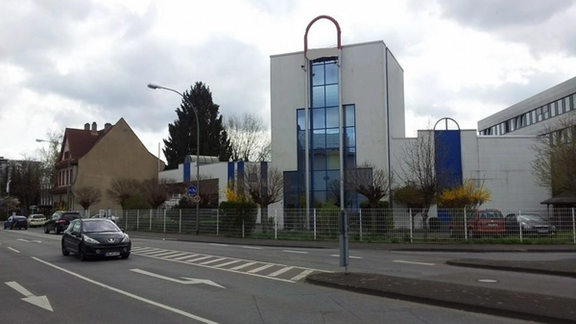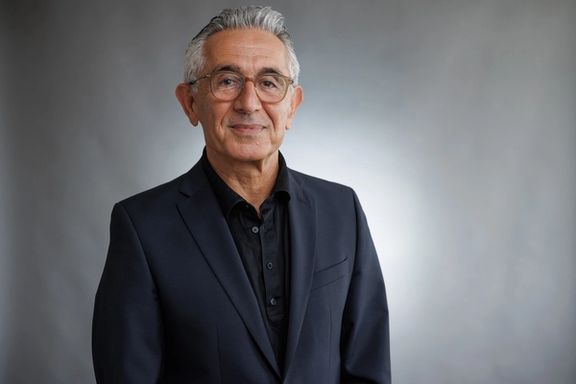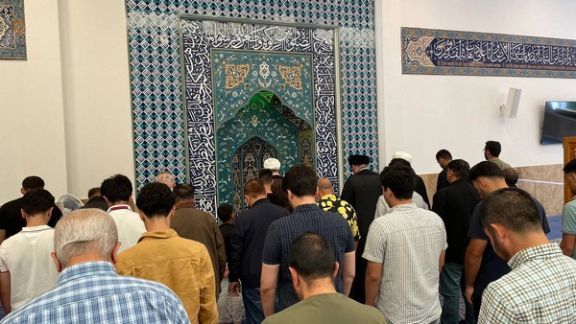Iranians Push For Regime-Linked Center In Frankfurt To Be Banned

German Iranians are demanding the state government of Hesse shut down the pro-Iran regime Center for Islamic Culture in Frankfurt that honored Qasem Soleimani.

German Iranians are demanding the state government of Hesse shut down the pro-Iran regime Center for Islamic Culture in Frankfurt that honored Qasem Soleimani.
A Frankfurt Social Democrat Party politician Turgut Yüksel has shared information about the strong ties between the Center for Islamic Culture and Iran’s regime.
Iran International reviewed state of Hesse’s response to Yüksel’s “minor interpellation”—a formal written request by a member of the state parliament seeking concrete information about government conduct.
According to answers with respect to Yüksel’s request, the state’s ministry of interior and sport wrote, “The Center for Islamic Culture Frankfurt (ZIK) was influenced by the Islamic Center of Hamburg (IZH). The ZIK property was acquired by the IZH in 2012 and was still owned by the IZH in 2022. Until November 2020, the long-time head of the ZIK was also chairman of the Shiite umbrella organization ‘Islamic Community of Shiite Communities in Germany’ (IGS), which in turn sees the IZH as a reference organization for itself and its member associations.”
When asked by Yüksel “What options does the state government see for restricting the activities of the associations that support the Iranian regime,” state secretary, Stefan Sauer, for the interior ministry, wrote “should an examination show that the goals or activities of the associations run contrary to criminal law or against the constitutional order or international understanding, ban could be come into consideration.”

German governments in Hamburg and Hesse have showed great tolerance and leniency toward Iranian regime-controlled mosques and centers, according to critics.
The German daily paper Die Welt termed the Islamic Center of Hamburg “Iran’s long arm in Europe” and has reported it has “links to a terrorist organization, “including being controlled by Iran’s Supreme Leader Ali Khamenei.
The domestic intelligence agency for Hesse wrote, in 2021, “The extent to which the ZIK acted in accordance with Iranian state doctrine was shown, for example, by the fact that it -- like the IZH -- held a commemoration event in 2020 for Qasem Soleimani, the leader of the Iranian Revolutionary Guards who was killed by the American military."

The intelligence report added, “Events with a positive connection to the Iranian regime were regularly held in the ZIK, especially on the anniversary of the death of Ayatollah Khomeini, the founder of the Islamic Republic of Iran."
The ZIK does not receive public funds, according to the Hesse government’s response.
Dr. Kazem Moussavi, a German-Iranian dissident who has campaigned for years against the ZIK, told Iran International, “The fact that the state of Hesse has not yet closed the ZIK is due to Germany’s policy of appeasement towards Iran. In 2018, federal president Frank-Walter Steinmeier received the former chairman of the IGS and the head of the Center for Islamic Culture in Frankfurt, Mahmoud Khalizadeh, at Bellevue Palace. This signaled the green light for the German-based institutions of the terror regime.”
Moussavi is the spokesman for the exiled Green Party of Iran in Germany.
Sheina Vojoudi, an Iranian refugee who lives in Germany, urged the state of Hesse to launch an intensive investigation of the ZIK. She told Iran International, “It almost impossible to consider an Islamic Center related to the Islamic Republic as non-political. The Islamic Republic mostly uses these centers as its source of money to lobby on a foreign soil like it does in the African countries recently.”
Vojoudi, who is an associate fellow for the Gold Institute for International Strategy, added “As an Iranian dissident deprived of my right to live in my own country, I would love to know every detail of the expenses related to all the Islamic Centers on German soil, which are funded by my country. Undoubtedly, this money needs to be spent for the Iranian children in Iran.”
Iran International press queries to the ZIK and to Marcus Gerngross, the spokesman for Hesse’s interior ministry, were not immediately returned.
Behrouz Asadi, the head of the Democratic Forum of Iranians in Mainz, sent Iran International a video of himself and Yüksel at a demonstration against a possible execution of Toomaj Salehi, a rapper opposed to the Islamic Republic, who has been incarcerated for his dissident activities.
Video footage from Asadi, a high-energy activist against the regime, showed protestors with pictures of Salehi and the political prisoner, Jamshid Sharmahd, who is a German citizen and was taken hostage by the clerical regime.
Asadi called for “release of all political prisoners in Iran” at one of the demonstrations and stressed the slogan “Women, Life, Freedom.”
Last week, Asadi participated at a protest in Frankfurt against the Islamic Republic following the shocking revelations that the German engineering giant Bosch sold 8,000 cameras to Iran that are used to conduct mass surveillance.
“If they sanctioned, how can you sell cameras to Iran regime?,” a demonstrator asked. “That is the most important question that people of Iran are asking.” The demonstrator showed a sign of European companies cutting deals with regimes that provide technology to repress and kill Iranians.
On X, formerly known as Twitter, there were social media posts calling for a boycott of Bosch.
When asked about whether Bosch violated its pledge to social responsibility, Dennis Christmann, a spokesman for Bosch, told Iran International “As a globally operating company, Bosch takes its social responsibility very seriously, and monitors international developments very closely. This is also the case in Iran. Respect for liberty and human rights is our most important priority. Diversity, openness, trust, and freedom of speech are core elements of our values-based corporate culture.”
Critics argue Bosch failed to do its due diligence about cutting a massive business deal with a totalitarian regime that has previously used tracking technology to imprison Iranian protesters and dissidents.
Bosch’s headquarters is in Stuttgart in the wealthy southwestern state of Baden-Württemberg. German politicians and officials in the state of Baden-Württemberg, from the governor Winfried Kretschmann to the allegedly antisemitic civil servant Michael Blume to the mayor of Freiburg, Martin Horn, go to great lengths to promote relations with Iran’s regime and ignore Iranian dissidents and grave human rights violations in Iran, according to critics.